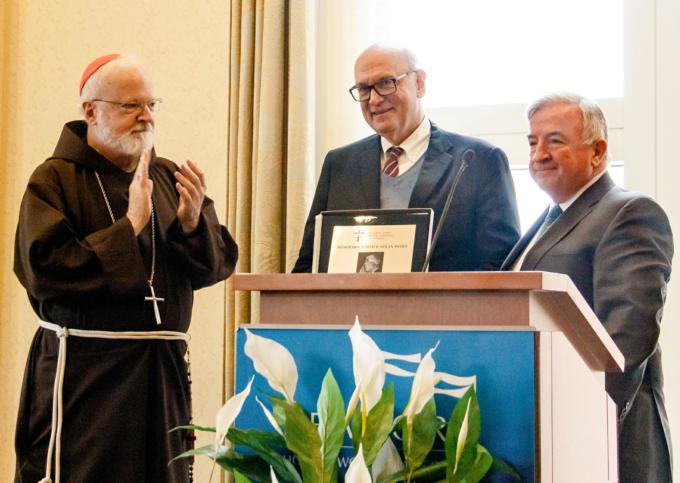
Culture

Duncan
(The following is an excerpt from a talk I gave following Boston's Red Mass on Sunday, Nov. 17, 2019.)
The work of a lawyer can be understood variously. I will mention four conceptions: as a job, as a career, as a profession, and as a calling or vocation. This is a sign, by the way, that I am an accomplished lawyer. I just used five terms to describe four concepts. At this rate, I could be able to generate 20 percent more billable hours this week.
Speaking of which: Considering our work as a mere job or career focuses on the wages, hours, and working conditions: what kind of benefits and perks accrue to us so we can earn our living and support our families over our lifetime. Ultimately, it's all about us.
I am reminded of the nursery riddle that mentions St. Ives, the 13th-century lawyer from Brittany who is the patron saint of lawyers. Everyone thinks that St. Thomas More is the patron saint of lawyers, but actually St. John Paul II proclaimed him patron saint of statesmen in the year 2000, the same year the Law Society of Great Britain named him Lawyer of the Millennium. Anyway, the riddle reads:
"As I was going to St. Ives,
I met a man with seven wives.
Each wife had seven sacks,
Each sack had seven cats,
Each cat had seven kits:
Kits, cats, sacks and wives,
How many were going to St. Ives?"
The answer is one: Me. I was going to St. Ives. So, it doesn't have anything to do with St. Ives, the man with seven wives, the sacks, cats, and kittens. We don't have to do the math. It's all about me.
The temptation of practicing law and considering it merely in terms of job or career is to make it all about me, and not about the others, not about the clients, the causes, the principles: in a word, about the pursuit of justice. Or the temptation to view justice only instrumentally, as what's in it for me, how much I can get out of it. "It's not about the principle; it's about the money." How much justice can you afford?
It's a bit like a lawyer's joke. In fact, there's a Latin ditty about St. Ives that reads:
Sanctus Ivo erat Brito,
Advocatus et non latro,
Res miranda populo.
"St. Ives was a Brit,
A lawyer and not a thief:
Something for people to marvel at."
Well, a higher conception of lawyering, beyond the simple notions of job or career, is to think of it as a profession. In fact, it is one of the three learned professions that were studied in the medieval university: law for lawyers at Bologna, medicine for doctors at Salerno, and theology for clergy at Paris. Indeed, the Red Mass and the idea of a Catholic Lawyers Guild all spring from the Christian Middle Ages.
Taken for what it is supposed to mean, "profession" is not just a highfalutin word conveying status, wealth, and attitude. It's supposed to be about something truly above. What characterizes a profession is an advanced level of expertise or learning, service to others (clients, patients, or souls), and pursuit of a social good (justice, health, or salvation) according to some shared standard. Professions profess: the attorney's oath here in Massachusetts, some form of the Hippocratic Oath for doctors, and the Christian Creed for clergy. They all have a strong ethos of service.
Another way of saying it: The profession has broken out of the orbit of self. It's not simply about me anymore. It's about others: serving clients and the pursuit of justice, being officers of the court -- in the case of our legal profession.
I hope you won't think it pedantic if I engage in a bit of parsing two of our profession's names: In addition to being lawyers and attorneys, we're also advocates and counselors. These last two terms have a rich linguistic pedigree: "Advocate" comes from the Latin "advocatus." Indeed, the Spanish cognate is "abogado," the preferred name for lawyer ... not to be confused with avocado, which is a type of fruit. Anyway, "advocatus" means "called to." The other term, "counselor," is a translation of the ancient Greek "paracletos," which literally also means "called to."
Called to what? Both "advocate" and "counselor" are relational terms: it's not just about me. It's about being summoned to justice for the client, before the judge or court.
Now justice can be considered in its classic definition as "rendering to each one what is his or her due," "to each his own." Or it can be considered more broadly, as in the Bible, as righteousness or holiness in the sight of God. Joseph of Nazareth is described as a just man in that sense. From that perspective, we can consider lawyering as a calling or vocation from God to justice and holiness. Like the Blues Brothers, we are on a mission from God.
One of the great teachings of Vatican II, which St. Pope Paul VI called its central teaching, is that all are called to holiness. That includes lawyers, judges, law students, and court personnel. In that regard, we are to imitate Christ, who embodies Torah or Law, is our Advocate, the Sun of Justice, and our Judge, Legislator, and King. (The three branches of government are all united in him.) Turns out that our Blessed Mother is also referred to as Advocate, as in the "Hail, Holy Queen." "Turn then most gracious advocate thine eyes of mercy towards us." Our Lady is in effect a female attorney who intercedes with her son at Cana to get some wine at the wedding reception. ("They have no wine" is what Mary says to Jesus all the time, on behalf of you and me.)
The term Paraclete, or Counselor or Consoler, is applied in the New Testament to the Holy Spirit, but also to Jesus. Understand that it literally means "advocate." In our practice of law, we Christians and Catholics are to be like Jesus, Mary, and the Holy Spirit.
A tall task? A stretch? Sure. In fact, beyond our capacities. But, with God, all things are possible. At the risk of being a bit of a pious fraud, I would like to suggest four ingredients of the pursuit of holiness in our profession: humility, humor, passion for justice, and love for our clients, adversaries, and court personnel. Jesus said, "I came to serve and not to be served." We should approach every legal challenge with the goal of being of help. This takes humility. To help is to serve. To serve is to be a servant. To be a servant is to embrace humility.
A sense of humor is also important. A lot of situations in life you can either laugh about or cry about. I think it's healthier and more pleasant for others if we can see the comedy. Ultimately, if we love God, as St. Paul says, all things work unto the good. We're part of a Divine Comedy, like Dante passing through Hell to Purgatory and then Heaven. All's well that ends well.
Then, to have a passion for justice. Not just "social justice" or "racial justice," or "environmental justice," though it includes all of them. Just ... justice. We should want to right the wrongs that we encounter in life through our clients. If we are not seeking justice by our legal work, then we are just being legal sticklers and nay-sayers.
Finally, our goal should be to live the great commandment of love on the job: to love our clients, and even our adversaries, as well as judges and people who work in the courts. To extend a sincere offer of friendship to everyone. To live the Golden Rule of doing to others as we would have them do to us. To be courteous and respectful to all, to be civil, to be accommodating, to be patient, to be kind ... to grant the continuance ...
These are my pleadings. May it please the court, here and above.
- Dwight G. Duncan is professor at UMass School of Law Dartmouth. He holds degrees in both civil and canon law.
Recent articles in the Culture & Events section
-
Tolkien's world, still popular on the big screen, began with faith and wordsCecilia Hadley
-
Scripture Reflection for Dec. 22, 2024, Fourth Sunday of AdventDeacon Greg Kandra
-
Getting adult children to Christmas MassGreg Erlandson
-
The work of redemptionEileen McLaughlin
-
Intern reflectionsEmily Greco and James Kaeser


















